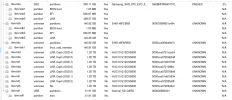Hi,
i recently found out, that the value displayed in PVE-Manager under datacenter -> host -> Disks equals accordingly to the output of smarctcl to the "Logical unit id" rather then the "Serial number", which is confusing.
This happens on all Servers having a HP P420 HBA.
When using the command
smartcli -d cciss,X /dev/sdX --all
the value displayed in the PVE-Manager is associated to the "Logical unit id".
If a disk is connected via the internal SATA-Bus, the serial number in PVE-Manager is correctly (see /dev/sda) displayed.

Is there a setting which I don't know of, where I can tell PVE-Manager, that I use such a HBA to correct this?
Also, as you can see, the SMART Status cannot be displayed as well.
Regards,
Felix
i recently found out, that the value displayed in PVE-Manager under datacenter -> host -> Disks equals accordingly to the output of smarctcl to the "Logical unit id" rather then the "Serial number", which is confusing.
This happens on all Servers having a HP P420 HBA.
When using the command
smartcli -d cciss,X /dev/sdX --all
the value displayed in the PVE-Manager is associated to the "Logical unit id".
If a disk is connected via the internal SATA-Bus, the serial number in PVE-Manager is correctly (see /dev/sda) displayed.

Is there a setting which I don't know of, where I can tell PVE-Manager, that I use such a HBA to correct this?
Also, as you can see, the SMART Status cannot be displayed as well.
Regards,
Felix



